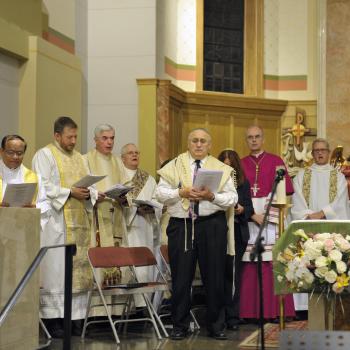She’s a widow, doing her thing outside Baltimore (go Terps!) and took a moment to chat with Margaret Cabaniss at Inside Catholic.
Snip:
What does your average day look like?
If you go back to the desert fathers, they say, “Go sit in your cell, and your cell will teach you everything.” That’s the kind of life it is. You’re in silence, you live simply. In a religious community, you would have a Rule; as a hermit, I have to create my own Rule and horarium, or daily schedule, and then the bishop has to approve it.
But the schedule is like life in a community: periods of time for work and prayer. You can be busy in your own place — this is a 100-year-old house that my grandfather built, so there’s always something to do. But unlike in a community, I have to do all the jobs in the house myself: I’m the cook, bottle-washer, and the maintenance man. I’m in charge of the whole hermitage.
It’s work and prayer — sometimes your work is your prayer.
Do you leave the house often, or have other people visit you?
No, I only go out in the morning for my errands and then have people come to me for spiritual direction.
How has that been for your family?
My husband John used to say, “If anything happens to me, Mary’s probably going in the convent,” so I think some people were expecting it more than I was. But it’s still been hard for them. My son and his wife have been very supportive from the very beginning, but they just had a baby, and they live five minutes away. . . It would be so easy if I packed my bag and went to the train station and kissed everybody goodbye, but that didn’t happen — I’m still in the neighborhood. I can see them occasionally, if they come for a visit, but they can’t stay for the whole day.
I gave up all of that to pray — to live in silence and solitude and simplicity. However, I can be in contact with people: I have an e-mail address and I’m in contact with other hermits and with my son. I have a phone, but after my family and friends came to my profession Mass, it stopped ringing. I think then people really understood a lot more.
Some people might look at the life you’ve chosen and think, “You’re just living by yourself, for yourself.” How do you explain the significance of your vocation to people who don’t understand the choice you’ve made?
I think a hermit’s vocation is to pray for everyone, and people feel free to ask. I have an intention book that I keep in the chapel on the altar between the Blessed Sacrament and the crucifix, so that it’s always before the Lord; and each time I go in, I try to remember the people who have asked for prayers. I think we’re the back-up power for them; we’re praying that all goes well for them. We pray for the whole world — not just the people across the street, but the world at large.
Check out the rest, with more background on how she discerned this unusual way of life.












